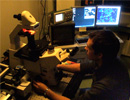Veigel Group
Many types of cellular motility, ranging from muscle contraction, intracellular transport, transcription or translation, to signal transduction in vision or hearing, are based on motor-proteins. We focus on the myosin family of motors, which interact with actin filaments. We also study DNA-helicases. We develop single molecule experimental procedures and analysis techniques to investigate, in combination with molecular and cell biology, the basic mechanisms of chemo-mechanical energy transduction of these motors, how they are regulated, and in which way they have been tuned for their specific functions in the cell.
The general aim is to study mechanisms of force generation and motility from the molecular to the cellular level. On the molecular level we aim to understand the details of conformational changes, timing and energetics of the process. To achieve this we need to precisely identify and correlate structural, biochemical and mechanical states of these nano-machines.
The various functions of cellular motility however are never based on motor proteins working in isolation. Mechanical interaction between motors, interactions with regulatory agents in local complexes, or in more extended networks, introduce a whole new layer of complexity that needs to be experimentally explored and also modelled.


